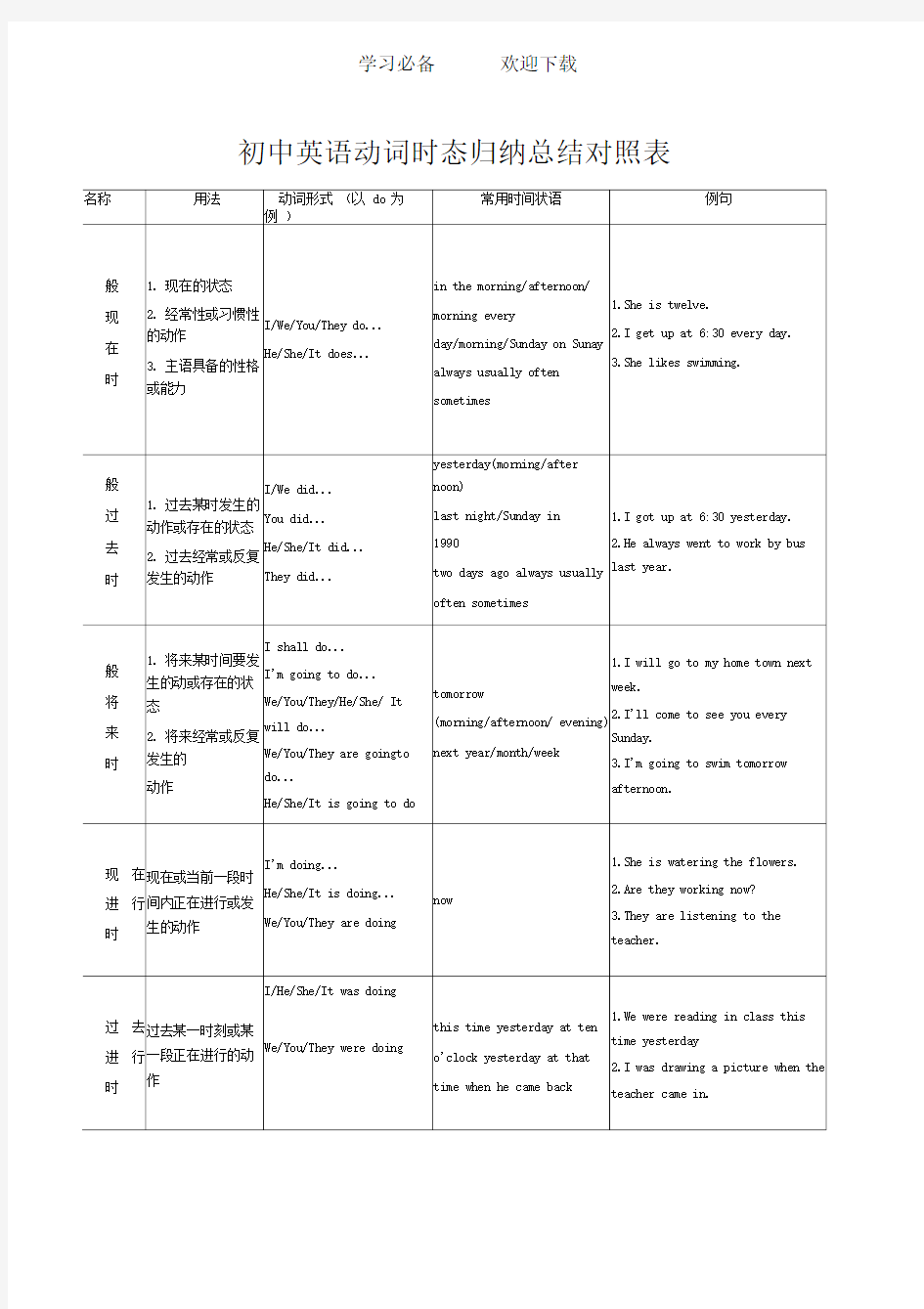
初中英语动词时态归纳总结对照表
- 格式:docx
- 大小:56.05 KB
- 文档页数:19


学习必备欢迎下载
初中英语动词时态归纳总结对照表
初中英语时态专项练习
1、 一般现在时。
通常用 “ usually, often, every day, sometimes ”。 一般现在时基本用法介绍 一、一般现在时的功能
1. 表示事物或人物的特征、状态。如: The sky is blue. 天空是蓝色的。
2. 表示经常性或习惯性的动作。如: I get up at six every day. 我每天六点起床。
3. 表示客观现实。如: The earth goes around the sun. 地球绕着太阳转。
二、一般现在时的构成 : 肯定句 :
1)
. 主语 +系动词 be(is, am, are )+ 名词(形容词,介词
短语)
2) . 其他主语 +动词原形 +其它
第三人称单数 +动词 -s+ 其它 如: I am a boy. 我是一个
男孩。
现 在
完
成 时
过 去
完
成 时 现 1. 过去发生或已
经 完成的某一动作对 现在造成的影响或 结果
2. 表示过去已经
开 始并持续到现在的 动作或状态
过去某一时间前已 经发后的动作或状 态
He/She/It has done
We/You/They have
I/We/You/He/She/I t had done ⋯⋯.
already just before
ne ver
for three years since 1990 this morning these days
by the end of ⋯
when+ 一般过去时 before+ 一般过去时
1.I've already posted the letter.
2.We have known each other for ten years.
3.They lived here since 1997.
4.Have you ever been to Beijing?
1.I had learned 2000 words by the end of last term.
2.When I got out,the bus had already left.
在
完
成 进 行 时
现在以前的一段时 间里一直进行的动 作,这个运作可能 仍在进行 , 也可能 继
I/We/You/They have been doing ⋯. He/She/It has been doing ⋯.
since nine o ' clock for five hours
1.I have been skating for five hours.
2.She has been skating since nine o ' clock..
We study English. 我们学习英语。Mary likes Chinese. 玛丽喜欢汉语。
三、一般现在时的变化
否定句:1)主语+ be ( is,am,are )+ not + 其它。如:He is not a worker. 他不是工人。
2) 其他主语+do not(don ' t) 动词原形+其它I don't like bread
第三人称单数+does not(doesn ' t) 动词原形+其它He doesn't often play.
一般疑问句:1)Be( Is,Are ) +主语+其它?如:-Are you a student? -Yes. I am. / No,
I'm not.
2)Do 其他主语+动词原形+其它?Does+第三人称单数+动词原形+其它+?注意:遇I/we —you, my —your, some —any.
Does she go to work by bike? - Yes, she does. / No, she doesn't.
Do you often play football?- Yes, I do. / No, I don't. 特殊疑问句:疑问词+一般疑问句。如:Where is my bike? How does your father go to work?
一般现在时用法专练:
一、用括号内动词的适当形式填空。
1.He often ____ (have) dinner at home.
2.Daniel and Tommy _____ (be) in Class One.
3.We _____(not watch) TV on Monday.
4.Nick ____ (not go) to the zoo on Sunday.
5.____ they _____ (like) the World Cup?
二、按照要求改写句子
1.Daniel watches TV every evening.( 改为否定句)
2.I do my homework every day.( 改为一般疑问句,作否定回答)
3.She likes milk.( 改为一般疑问句,作肯定回答)
7. I like taking photos in the park.( 对划线部分提问)
8. John comes from Canada.( 对划线部分提问)
三、改错( 划出错误的地方,将正确的写在横线上)
1.Is your brother speak English? _____________
2.Does he likes going fishing? ____________
3.He likes play games after class. ___________